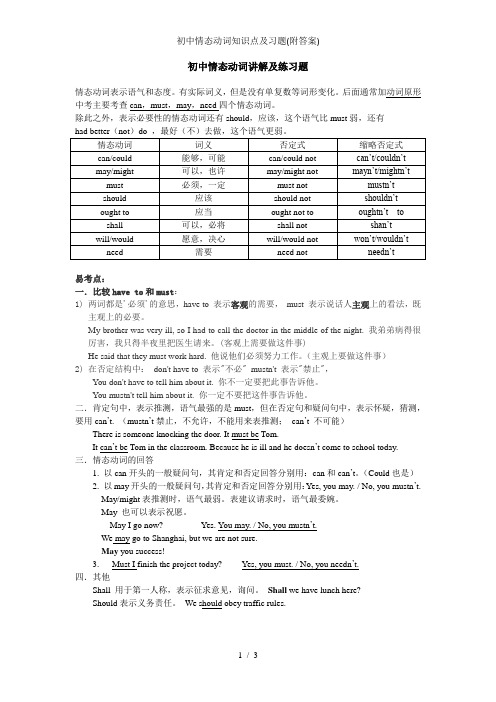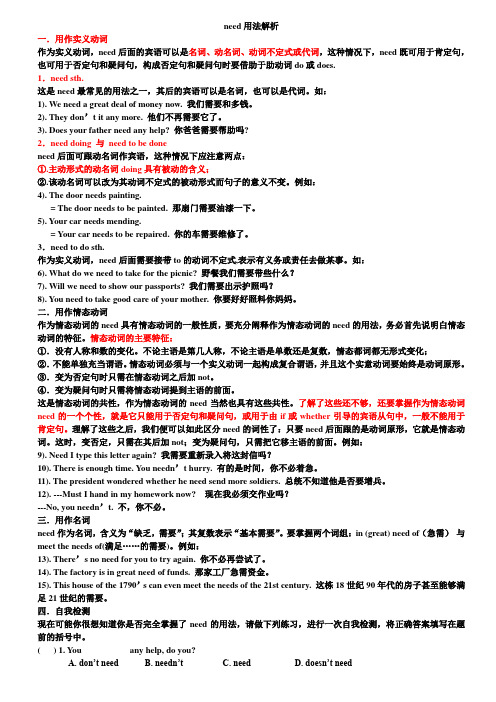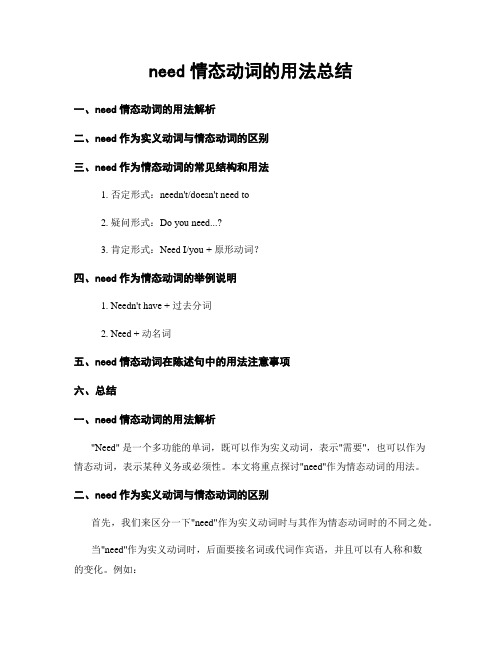小升初英语情态动词need专项讲解习题
Need和dare的用法小结与练习含答案

Need/Dare的用法与练习(含答案)Need的用法1. need作情态动词need作情态动词用时,主要用于否定句和疑问句中,形式为need not+原形动词。
(need 辅助后面实义动词,有一定的词义,但不能独立使用)例:宾语+ 状语注意用need 提问时,肯定回答为must,否定回答为needn’t或don’t have to。
例:—Need I finish the work today? (need助动词)—Yes, you must .是的。
—No. you needn’t /don’t have to. 不,你不必。
2. need作实义动词作实义动词,need和普通动词一样,有人称、数和时态的变化,后接名词、代词、不定式或动名词做宾语,可用于任何句子。
need肯定陈述句中独立做谓语,而疑问和否定则要借助于do构成。
如:Do you need a dictionary? 你需要词典吗?1)如果主语是人,句型如下:sb. need(s) sth. 某人需要某物sb. need to do sth. 某人需要去做某事例:I need to pass the exam. 我需要通过这次考试。
He needs to learn English .他需要学习英语。
You need my help.主语+2)如果主语为某物某物需要某种方法处理时,need之后可接不定式短语,但一定为被动语态;也接doing,但一定为主动语态。
句型如下:Sth. need doing 某事需要被做= need to be done特别注意两点:①.主动形式的动名词doing具有被动的含义;也接动名词,但一定为主动语态。
②.该动名词可以改为其动词不定式的被动形式而句子的意义不变。
例如:.例:The flowers need watering.= The flowers need to be watered. 这些花需要浇水。
小升初英语:情态动词专项练习题附答案

小升初英语:情态动词专项练习题附答案1.I told Sally how to get here。
but perhaps I should have written it out for her.2.-There were already five people in the car but they managed to take me as well。
-It XXX.3.It's nearly seven o'clock。
Jack must be here at any moment.4.Johnny。
you mustn't play with the knife。
you could hurt yourself.5.XXX was able to get out.6.-When can I come for the photos。
I need them tomorrow afternoon。
-They should be ready by 12:00.7.-XXX while in New York。
-Oh。
did you。
You should have stayed with Barbara。
I shared XXX with you to help you prepare for the English entrance exam for r high school。
In the first sentence。
I suggested that I should have written out the ns for Sally。
In the second sentence。
I used "couldn't have been" to XXX sentence。
I used "must" to XXX。
I reminded Johnny not to play with knives。
初中情态动词知识点及习题(附答案)

初中情态动词讲解及练习题情态动词表示语气和态度。
有实际词义,但是没有单复数等词形变化。
后面通常加动词原形中考主要考查can,must,may,need四个情态动词。
除此之外,表示必要性的情态动词还有should,应该,这个语气比must弱,还有易考点:一.比较have to和must:1) 两词都是'必须'的意思,have to表示客观的需要,must 表示说话人主观上的看法,既主观上的必要。
My brother was very ill, so I had to call the doctor in the middle of the night.我弟弟病得很厉害,我只得半夜里把医生请来。
(客观上需要做这件事)He said that they must work hard.他说他们必须努力工作。
(主观上要做这件事)2) 在否定结构中:don't have to 表示"不必" mustn't表示"禁止",You don't have to tell him about it. 你不一定要把此事告诉他。
You mustn't tell him about it. 你一定不要把这件事告诉他。
二.肯定句中,表示推测,语气最强的是must,但在否定句和疑问句中,表示怀疑,猜测,要用can’t. (mustn’t禁止,不允许,不能用来表推测;can’t 不可能)There is someone knocking the door. It must be Tom.It can’t be Tom in the classroom. Because he is ill and he doesn’t come to school today.三.情态动词的回答1. 以can开头的一般疑问句,其肯定和否定回答分别用:can和can’t。
need用法及练习

need用法解析一.用作实义动词作为实义动词,need后面的宾语可以是名词、动名词、动词不定式或代词,这种情况下,need既可用于肯定句,也可用于否定句和疑问句,构成否定句和疑问句时要借助于助动词do或does.1.need sth.这是need最常见的用法之一,其后的宾语可以是名词,也可以是代词。
如:1). We need a great deal of money now. 我们需要和多钱。
2). They don’t it any more. 他们不再需要它了。
3). Does your father need any help? 你爸爸需要帮助吗?2.need doing 与need to be doneneed后面可跟动名词作宾语,这种情况下应注意两点:①.主动形式的动名词doing具有被动的含义;②.该动名词可以改为其动词不定式的被动形式而句子的意义不变。
例如:4). The door needs painting.= The door needs to be painted. 那扇门需要油漆一下。
5). Your car needs mending.= Your car needs to be repaired. 你的车需要维修了。
3.need to do sth.作为实义动词,need后面需要接带to的动词不定式,表示有义务或责任去做某事。
如:6). What do we need to take for the picnic? 野餐我们需要带些什么?7). Will we need to show our passports? 我们需要出示护照吗?8). You need to take good care of your mother. 你要好好照料你妈妈。
二.用作情态动词作为情态动词的need具有情态动词的一般性质,要充分阐释作为情态动词的need的用法,务必首先说明白情态动词的特征。
小学英语情态动词知识点及练习

情态动词【知识要点】:情态动词(Modal verbs)本身有一定的词义, 表示语气的单词。
但是不能独立作谓语, 只能和动词原形一起构成谓语。
情态动词用在行为动词前, 表示说话人对这一动作或状态的看法或主观设想。
情态动词虽然数量不多, 但用途广泛, 主要有下列: can (could), may (might), must, need, ought to, dare (dared), shall (should), will (would) must not.情态动词无人称和数的变化, 情态动词后面跟的动词须用原形, 否定式构成是在情态动词后面加 "not"。
疑问形式是将情态动词提至主语前。
个别情态动词有现在式和过去式两种形式, 过去式用来表达更加客气, 委婉的语气, 时态性不强, 可用于过去, 现在或将来。
情态动词属非及物动词, 故没有被动语态。
【典型例题】:【专题一】:can和could的用法【例1】Can you lift this heavy box?(体力)【解析】表示能力(体力、知识、技能)【练习】1.Mary speak three languages.(知识)2... yo.skate?(技能)此时可用be able to代替。
Can只有一般现在时和一般过去式;而be able to 则有更多的时态。
I’ll not be able to come this afternoon.当表示“经过努力才得以做成功某事”时应用be able to,不能用Can。
【例2】-----Can I go now?----.Yes.yo.can..No.yo.can’t.【解析】表示请求和允许。
此时可与may互换。
在疑问句中还可用could,might 代替,不是过去式,只是语气更委婉,不能用于肯定句和答语中。
【练习】---- I come to see you tomorrow?---.Yes.yo.....----No.yo..../I’.afrai.not.【例3】Can this be true?【解析】表示推测(惊讶、怀疑、不相信的态度),用于疑问句、否定句和感叹句中。
人教版小升初(完整版)情态动词专题(练习题含答案)

人教版小升初(完整版)情态动词专题(练习题含答案)一、选择题1.—Where is Tom? I am considering ________ him about the result of the exam.—Oh. You ________. He has known it already.A.to tell; can't B.telling; needn't C.tell; mustn't D.told; shouldn't 2.Don’t cross the road until the traffic lights turn green. A car_______hit you.A.need B.may C.should D.must 3.—Mum, why do I have to wear a mask before entering the supermarket?—For your health and safety, you ________ be too careful.A.shouldn’t B.can’t C.mustn’t D.needn’t 4.—Hurry up, Jack! Let’s cross the road as fast as possible.—No, you ________. Don’t you see the light is still red?A.couldn’t B.wouldn’t C.mustn’t D.needn’t5.—Be careful! Fire ________ be dangerous sometimes.—OK. I will put it out right away.A.mustn’t B.should C.can D.needn’t6.We shouldn’t throw any objects from the building. Even a small object ________ cause serious injuries or death, when dropped from a great height.A.must B.should C.may D.need7.Our Chemistry teacher always tells us we ________ be too hardworking before the exams. A.mustn’t B.shouldn’t C.needn’t D.can’t8.—Dad, must we wait until the light becomes green?—Yes, I am afraid we ________. That’s the traffic rule.A.may B.can C.have to D.need9.—How do you like my new dress?—Well, if I ________ say, it is not suitable for you.A.may B.must C.have to D.should10.You ________ write the report again because spelling mistakes are not allowed at all. A.must B.can C.may D.could11.—I must go to school today, ________?—No, you ________.You can go as soon as you get well.A.mustn’t I;needn’t B.needn’t I;needn’tC.mustn’t I;mustn’t D.needn’t I;mustn’t12.When you visit a museum, some instructions should ________ and we’d better not ________ them.A.pay attention to; be against B.be paid attention; againstC.be paid attention to; against D.be paid attention to; be against13.If you buy your mum an iRobot floor cleaner, she ________ sweep the floor every day. A.can’t B.mustn’t C.needn’t D.shouldn’t 14.— Zoe, what do you think is the greatest advantage of shopping online?— At least I ______ spend much time going from shop to shop.A.shouldn’t B.can’t C.needn’t D.mustn’t 15.—Have you decided to take up teaching as career after graduation?—I ________ go abroad for further education instead. But it depends.A.must B.should C.may D.shall16.—The high school entrance examination is coming!—Yes, our teacher tells us we _______ be too careful while taking exams.A.mustn't B.shouldn't C.needn't D.can't17.We’ve discussed every detail of this plan and have got e verything ready. But still something __________ go wrong. We still have to be very careful.A.must B.should C.would D.may 18.—Amy, I hear you've got many foreign coins._______ I have a look?—Of course, I'll fetch them for you.A.May B.MustC.Should D.Need19.Think twice before making a decision, or you __________ get into trouble.A.may B.can't C.shouldn't D.mustn't20.— Is Lang Lang going to perform at Art Center this Friday?— Yes. It ________ be him. He has been here for three days.A.might B.must C.mus tn’t D.may 21.Sometimes smiles ________ be false, hiding other feelings like anger, fear or worry. A.should B.would C.must D.can22.—Suzy described every detail of the accident just now.—Her memory ________ be completely back.A.shall B.need C.must D.could23.Never throw objects from the building. Even a small object ________ cause serious injuries, or death, when dropped from a great height.A.must B.should C.may D.need24.Most young people like shopping online because they ________ spend much time going from shop to shop.A.needn’t B.can’t C.mustn’t D.shouldn’t 25.— Mum, why do I have to wash hands so many times a day?—You ________ be too careful, for your health.A.can’t B.mustn’t C.may not D.needn’t 26.When people are waiting at the zebra crossing, cars and buses ________ wait and let them go first.A.must B.may C.can D.need27.—Will dad arrive home at 6 o’clock to have dinner with us this evening?— I think he will, but he ________ not. Sometimes he works extra hours.A.can B.must C.need D.may28.—Seventy dollars for such a dress! You ________ be joking!—I’m serious. It’s made of silk from Hangzhou.A.must B.need C.will D.can29.— Excuse me, could you tell me where the Nanjing Brocade Museum is?— Go along this road for five minutes. You ________ miss it. It’s a huge building.A.mustn’t B.can’t C.needn’t D.shouldn’t 30.—Excuse me. I haven’t finished reading the book yet. May I keep it a bit longer?— Sorry, you ________. You must return it on time.A.needn’t B.can’t C.won’t D.shouldn’t 31.— What is th at young lady’s job?—She ________ be a nurse, I’m not sure.A.must B.may C.need D.would32.You’ve got an A in the maths test again. You ________ be good at it.A.can B.may C.must D.should 33.—Could you tell me how to renew the library books?—With pleasu re. You ________ come to our desk every time. It’s easier to renew them online. A.can’t B.mustn’t C.needn’t D.shouldn’t34.For the safety of the passengers, objects like guns ________ be carried on board.A.may not B.needn’t C.might not D.mustn’t 35.—The a rticle says that a person’s animal sign decides his personality.—You ________ read it for fun, but don’t believe in that.A.can B.must C.shouldn’t D.needn’t36.— What do you think of the show yesterday?— Some of them were really good but others ________ be better.A.will B.must C.need D.can 37.—Who’s the man over there? Is that Mr. Black?—It ________ be him. Mr. Black is much taller than that man.A.may B.must C.can’t D.mustn’t 38.—May I have some wine to drink?—No, you ________. You have to drive home later.A.mustn’t B.needn’t C.can’t D.may not 39.—Could I join you in the programme?—Sorry, you ________. You are too young.A.shouldn’t B.mustn’t C.can’t D.needn’t 40.—Must we stop the Japanese government discharging nuclear waste water (排放核污水) into the Pacific Ocean?—________. Because everyone should protect our earth and it is bad ________ us to eat the polluted seafood and drink the waste water.A.Yes, we can; of B.No, we mustn’t; of C.Yes, we must; for D.No, we needn’t; for 【参考答案】1.B解析:B【详解】句意:——汤姆在哪里?我正在考虑告诉他考试的结果。
Need和dare的用法小结和练习含答案

Need/Dare的用法与练习(含答案)Need的用法1. need作情态动词need作情态动词用时,主要用于否定句和疑问句中,形式为need not+原形动词。
(need 辅助后面实义动词,有一定的词义,但不能独立使用)例:宾语+ 状语注意用need 提问时,肯定回答为must,否定回答为needn’t或don’t have to。
例:—Need I finish the work today? (need助动词)—Yes, you must .是的。
—No. you needn’t /don’t have to. 不,你不必。
2. need作实义动词作实义动词,need和普通动词一样,有人称、数和时态的变化,后接名词、代词、不定式或动名词做宾语,可用于任何句子。
need肯定陈述句中独立做谓语,而疑问和否定则要借助于do构成。
如:Do you need a dictionary? 你需要词典吗?1)如果主语是人,句型如下:sb. need(s) sth. 某人需要某物sb. need to do sth. 某人需要去做某事例:I need to pass the exam. 我需要通过这次考试。
He needs to learn English .他需要学习英语。
You need my help.主语+2)如果主语为某物某物需要某种方法处理时,need之后可接不定式短语,但一定为被动语态;也接doing,但一定为主动语态。
句型如下:Sth. need doing 某事需要被做= need to be done特别注意两点:①.主动形式的动名词doing具有被动的含义;也接动名词,但一定为主动语态。
②.该动名词可以改为其动词不定式的被动形式而句子的意义不变。
例如:.例:The flowers need watering.= The flowers need to be watered. 这些花需要浇水。
need情态动词的用法总结

need情态动词的用法总结一、need情态动词的用法解析二、need作为实义动词与情态动词的区别三、need作为情态动词的常见结构和用法1. 否定形式:needn't/doesn't need to2. 疑问形式:Do you need...?3. 肯定形式:Need I/you + 原形动词?四、need作为情态动词的举例说明1. Needn't have + 过去分词2. Need + 动名词五、need情态动词在陈述句中的用法注意事项六、总结一、need情态动词的用法解析"Need" 是一个多功能的单词,既可以作为实义动词,表示"需要",也可以作为情态动词,表示某种义务或必须性。
本文将重点探讨"need"作为情态动词的用法。
二、need作为实义动词与情态动词的区别首先,我们来区分一下"need"作为实义动词时与其作为情态动词时的不同之处。
当"need"作为实义动词时,后面要接名词或代词作宾语,并且可以有人称和数的变化。
例如:- I need a break.(我需要休息。
)- She needs some money.(她需要一些钱。
)而当"need"作为情态动词时,后面不再需要接宾语,也不能有人称和数的变化。
例如:- You needn't worry.(你不必担心。
)- They don't need to clean the house.(他们不需要打扫房子。
)三、need作为情态动词的常见结构和用法1. 否定形式:needn't/doesn't need to"Need"作为情态动词表示否定时,通常使用"needn't"或者"doesn't need to"。
- 1、下载文档前请自行甄别文档内容的完整性,平台不提供额外的编辑、内容补充、找答案等附加服务。
- 2、"仅部分预览"的文档,不可在线预览部分如存在完整性等问题,可反馈申请退款(可完整预览的文档不适用该条件!)。
- 3、如文档侵犯您的权益,请联系客服反馈,我们会尽快为您处理(人工客服工作时间:9:00-18:30)。
小升初英语情态动词——need
need(需要)的用法与dare几乎完全相同。
即在否定句或疑问句中,和其他情态动词一样,本身无变化,后面用不带to的动词不定式;在肯定句中时,和实义动词一样,后面的动词不定式要带to,第三人称单数现在大凡时加-s,并有时态的变化。
如:
Need we return the magazines today?我们今天需要把杂志还回去吗?
Every member needs to pay only a little money a year to get medical care.每个成员每年只需缴一点钱就可以得到医疗。
You need not write down your translation. You may do it orally.你们不必写下这个翻译练习,口头做就行了。
[注]与dare一样,在否定句或疑问句里,need也可和实义动词相同,用助动词to do来帮助,后面的动词不定式必须带to。
如:
Do they need to take any tools with them?-No., they don“t need to.他们需要带工具吗? --不需要。
He did not need to go there early that day.那天他不必早去。
need后面有名词作宾语时
完全用作实义动词,表示“需要“或“缺乏“某件事物。
这时,它的变化和大凡实义动词完全相同。
如:
I need a dictionary.我需要字典。
You need a hair-cut.你该理发了。
Do you need a fountain-pen?你需要一支自来水笔吗?
I don“t need a new jacket.我不需要一件新茄克衫。
Mary looks tried,she needs a rest.玛丽看上去累了,需要休息。
Needn“t后加动词不定式(不带to)的完成式时
指过去已做了但勿须做的动作。
如:
You needn“t have watered the vegetables,as it is going to rain.你满可以不必浇菜,天要下雨了。
You needn“t have brought you r umbrella. We are going by taxi你满可以不必带伞,我们要坐出租汽车去。
[注一]注意didn“t have to和didn“t nee to则常表示过去未做也勿须做的动作。
如:I didn“t have to interpret it for her,for she knows Chinese.我勿须为她翻译,她懂汉语。
I didn“t need to take a taxi;it is only five minutes walk to the station.到车站只须走五分钟,我不需要坐出租汽车。
[注二] used to和had better也可看作是情态动词。
情态动词used to表示过去的习惯,但现在已无此习惯(would表过去习惯时则无此含义)。
如:
When I was young,I used to play football.我小时常踢足球。
He didn“t use to come. (或用usedn“t to)他过去不常来。
Did he used to come? (亦可说used he to...?)他过去常来吗?had better表可取,意为“应该“或“最佳“。
如:
We had better go now.我们最佳走吧。
You“d better stop now.你现在应该停下来。
(对长辈不可用had better)
Hadn“t we better go now?我们现在走不好吗?(had better大凡不用于肯定疑问句)。
